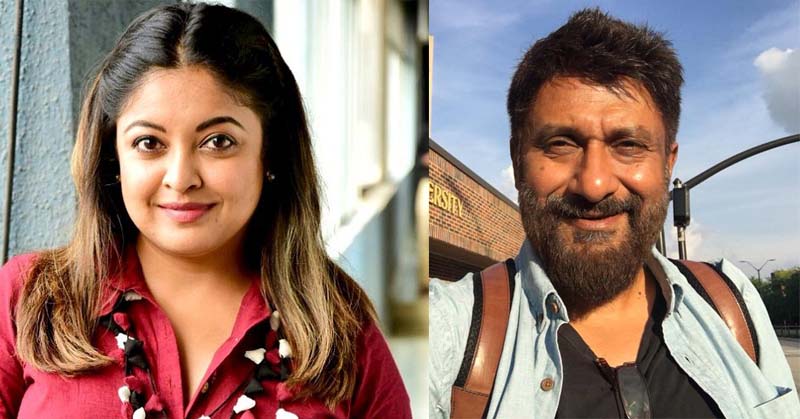Actor Tanushree Dutta recently spoke out against fellow actor Nana Patekar and choreographer Ganesh Acharya for sexually harassing her and intimidating her on the sets of her 2008 film, that eventually caused her to drop out. She alleged that Patekar demanded to do an intimate step with her that was not originally in the script and the choreographer was complicit with this. Moreover, when she refused she was threatened and grabbed. Her car was attacked while her parents were in it. She accused the film fraternity and senior actors for continuing to support Patekar. She further stated that on complaining, she was promptly replaced from the film. She further recounted another incident of sexual harassment from director Vivek Agnihotri.
Her allegations come in the light of several women speaking out against sexual assault they faced at some point. Padma Lakshmi just wrote a powerful piece in the New York Times on how she was raped at the age of 16 and waited several years to talk about the same. Among other things she talks about the loss of control such traumatic experiences can create and the lack of language to express what one has been through. She also raises the vital issue about how rapists in many cases get off without any repercussions. She says her inability to speak out then was perhaps influenced by an earlier sexual assault she had faced as a child. She recounts that when she spoke about it she was sent away to live with her grandparents.
These women are speaking post #MeToo movement and as very serious rape allegations against Brett Kavanaugh, an American jurist, are coming out. Christine Blassey Ford, a professor at Palo Alto University recently stated that Kavanaugh sexually assaulted her at the age of 15 (when he was 17 years old). At the time she was afraid that Kavanugh might inadvertently kill her during the attack. Her statement came to light in the context of another similar complaint against Kavanaugh by a woman who refused to be identified. Her statement was followed by the allegation of another woman, Deborah Ramirez, who attended Yale University with Kavanaugh, who said that he exposed himself to her and assaulted her. Soon after Julie Swentick, a former government employee stated that she witnessed Kavanaugh as a part of group waiting to gang rape a woman when they were in school. Kavanaugh has denied these allegations.
All these allegations are serious and speak about the larger rape culture and the culture of silencing the woman in any field all over the world. More worryingly these allegations have brought forth how society and law continue to fail women who report sexual assault. One of the biggest problem women face, when trying to report an assault, is countering hostility, apathy or complete refusal by society or authorities to believe them, and their version of events. Often this leads to either silencing or ostracism of these women leading them to live in denial, fear and even guilt and shame. In such cases when women do come out later with the truth they are further met with hostility and questioned on the veracity of their belated allegations.
US President Trump, who has been a supporter of Kavanaugh, has contested Ford’s claims, alleging it to be left wing conspiracy and that Ford would have informed the authorities years ago if the incident had truly taken place. He and many others who support Kavanaugh and doubt Ford because ‘why didn’t she speak up earlier’ have ignored notes from her therapy session where she talks about the incident, a polygraph that shows she is speaking the truth, statement of 24 women of the school who supported her claim, and another letter from over 1000 alumnae who have said that her account is consistent with what used to happen at the school at the time.
Closer home people are refusing to believe Dutta for ‘failing to complain for ten years’ – it must be noted that she had actually filed a complaint at the time (2008) with Cine and Television Artistes Association (CINTAA) for damage to her property and reputation – and using this allegation to somehow bizarrely ‘further her career or gain limelight’. Moreover, most of the film industry has so far not come in her support or even condemned generalized harassment that plagues the industry. Actor Amitabh Bachchan, who had starred in the critically acclaimed movie, Pink that opened up discussion about consent and women’s rights, also refused to comment stating that he is neither party. Journalist Janice Sequira who was on the film sets at the time has corroborated Dutta’s account. Yet women’s accounts continue to be disbelieved.
If these episodes have shown anything it is this – that powerful, well connected men will continue to get away with crimes against women because society is forever ready to doubt and ridicule the testimonies of survivors. Testimonies, that may have been difficult to give, given the hostility that surrounds women from every side. As a result culture of rape and ‘boys will be boys’ continues to let men act without any consequences to their actions. The first step towards ensuring any justice for women will entail believing women when they talk about an experience that is difficult to talk about no matter how many years it takes them to do the same.
No woman accuses a man of rape of attention. Women gain nothing by making ‘false accusations’ in a system that is designed to humiliate and mistrust them. The statistics for false rape cases that misogynist men talk about are miniscule. In reality, most rapists get off free and vast majority of sexual assaults and rape are not even reported. Globally and especially nationally we have a long way to go for ensuring safety for women.
Disclaimer: The opinions expressed in this article are the personal opinions of the author.


















